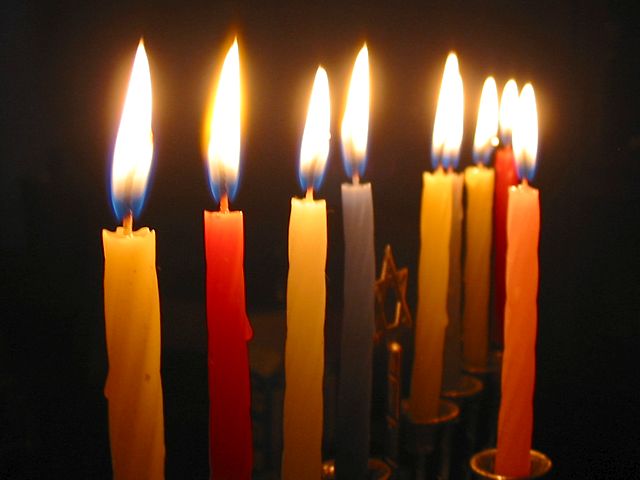University students at universities that support fraternities and sororities think "going Greek" refers to joining the on-campus organizations that function as selective clubs (ironically, "fraternity" and "sorority" come from Latin, but since these clubs are commonly named with Greek letters, the pledges join the "Greeks"). A recent (okay, not that recent)
movie capitalized on this culture. Er...apparently the expression is also used in such an utterly crass way that I simply cannot link to the slang - let it be known that I had no idea of this until I googled for the link to the movie (and let me recommend against you looking for it!).
Back in the day (around 167 C.E.), however, the Jews living in the Land of Israel were forced to choose between "becoming Greek" and letting themselves be killed. The death option meant no desecrating the religious commandments. Those willing to relinquish their traditions and their beliefs were permitted to be "hellenized" - to assimilate into the Greek culture and forget their Jewish heritage. Shifting focus to the physical and material (think about the Greek focus on the body, architecture, the pantheon of Greek gods...). The lack of choice in this choice led to war - anyone surprised?

The Jews' battled for the right to rule themselves and free themselves from the oppressor (known in traditional circles not as Antiochus Epiphanes (his name), but Antiochus Epimanes (Antiochus the Madman)). That's the lesser told story of Chanukah. It's not as glamorous as the miracle of one flask of oil that should have lit the Temple's menorah for only one day instead lasting the eight days that it took to produce more olive oil. Or alternatively, the miracle of finding any unblemished oil at all, given the rampant desecration of the Holy Temple by the Greeks.
The prayers of the week (fine: 8 days) focus on the military victory, however. The Jews were the underdog, and they prevailed against the mighty Greek army, chariots and all.
Megillat Hashmonaim recounts the struggle in vivid detail, and the
Apocryphal Books of Maccabees (
I,
II and
IV especially) present the history of the Jewish rebellion against all odds. Excellent reason for thanksgiving.
Perhaps only the famous talmudic question:
"Mai Chanukah?" (Shabbat 21b) brought fame to the tiny flask of oil. A military victory doesn't feel like a religious salvation, after all. Thus, the Aramaic question is understood to mean "on the occasion of what miracle was Chanukah established," and with the miracle of the flask of oil, the reason for the holiday as we know it today took hold.
מאי חנוכה דתנו רבנן בכ"ה בכסליו יומי דחנוכה תמניא אינון דלא למספד בהון ודלא להתענות בהון שכשנכנסו יוונים להיכל טמאו כל השמנים שבהיכל וכשגברה מלכות בית חשמונאי ונצחום בדקו ולא מצאו אלא פך אחד של שמן שהיה מונח בחותמו של כהן גדול ולא היה בו אלא להדליק יום אחד נעשה בו נס והדליקו ממנו שמונה ימים לשנה אחרת קבעום ועשאום ימים טובים בהלל והודאה
In the words of my father's rendition of the miracle of Chanukah (having heard this every night of Chanukah for many years of childhood, I think I can recall the words with precision): "IT KEPT ON BURNING!" The flame-that-didn't-go-out is magical to a child's imagination and miraculous to an adult's celebration of the holiday.
As reluctant as I am to sound preachy, I would just like to note that the choice to stay Jewish was literally a matter of life or death. Surely, the war that was fought for the sake of being able to choose to observe is worthy of notice among all the candles.
....And if you already pay more attention to the military victory, please don't forget the religious significance of the re-dedication of the spiritual center that affirmed the freedom to observe (or not, as the case may be).








No comments:
Post a Comment